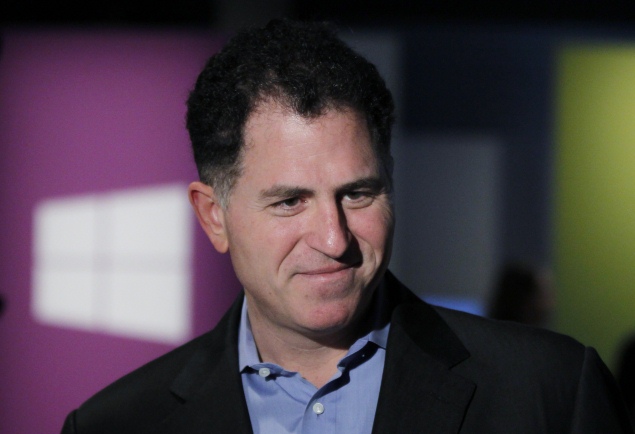- Home
- Laptops
- Laptops News
- Michael Dell's $750 million cash bet on Dell buyout
Michael Dell's $750 million cash bet on Dell buyout

The Dell founder and CEO this week struck a deal to take private the company he created out of a college dorm room in 1984, partnering with private equity house Silver Lake and Microsoft Corp.
Michael Dell will contribute $500 million of his own cash, and MSDC Management an affiliate of his investment vehicle, MSD Capital - will contribute another $250 million, according to a company filing on Wednesday.
Dell Inc also said it is targeting the repatriation of $7.4 billion of cash now parked abroad to help finance the deal. That may dismay some shareholders, as a hefty tax is usually levied on cash brought back from overseas.
The deal, which ends Dell's rocky 24-year run on the Nasdaq just as the once-dominant PC maker struggles to revive growth, is contingent on approval by a majority of shareholders excluding Michael Dell himself.
Several shareholders, including prominent investor Frederick "Shad" Rowe of Greenbrier Partners, have spoken out against the deal, protesting a lack of specifics as well as a potential conflict of interest with Michael Dell being the company's single largest shareholder with a roughly 16 percent stake.
"Some shareholders are glad. But there are others who feel it's a raw deal," said Shaw Wu, an analyst with Sterne Agee, who has spoken with several Dell shareholders since the announcement but declined to provide further details.
And so it begins
Dell was regarded as a model of innovation as recently as the early 2000s, pioneering online ordering of custom PCs and working closely with Asian suppliers and manufacturers to assure rock-bottom production costs. But it missed the big industry shift to tablet computers, smartphones and high-powered consumer electronics such as music players and gaming consoles.
Executives said on Tuesday the company will stick to a strategy of expanding its software and services offerings for large companies, with the goal of becoming a provider of corporate computing services - like the highly profitable IBM. They played down speculation the company may spin off the low-margin PC business on which it made its name.
The company has not given many specifics on what it would do differently as a private entity, angering some shareholders who said they needed more information to determine whether the $13.65-a-share deal price - a 25 percent premium to Dell's stock price before buyout talks leaked in January - was adequate.
On Wednesday, an individual shareholder filed the first lawsuit, in Delaware, attempting to stop the buyout. The lawsuit - which is seeking class-action status - maintains that the $13.65 per share offered sharply underestimated the company's long-term prospects.
"By engaging in the going private transaction now - in the midst of the company's transition from a PC vendor to full service software and enterprise solution provider - the board is allowing defendants M. Dell and Silver Lake to obtain Dell on the cheap," read the lawsuit filed by Catherine Christner.
Dell, the world's No. 3 personal computer maker, broke down details of the equity and debt financing secured for the buyout in Wednesday's filing.
Silver Lake is putting up $1.4 billion, while banks including Bank of America, Barclays, Credit Suisse and RBC will provide roughly $16 billion in term loans and other forms of financing.
Wednesday's filing also disclosed that under certain circumstances if the merger cannot be completed, Michael Dell and Silver Lake could have to pay a termination fee of up to $750 million to the company.
© Thomson Reuters 2013
Catch the latest from the Consumer Electronics Show on Gadgets 360, at our CES 2026 hub.
Related Stories
- Samsung Galaxy Unpacked 2025
- ChatGPT
- Redmi Note 14 Pro+
- iPhone 16
- Apple Vision Pro
- Oneplus 12
- OnePlus Nord CE 3 Lite 5G
- iPhone 13
- Xiaomi 14 Pro
- Oppo Find N3
- Tecno Spark Go (2023)
- Realme V30
- Best Phones Under 25000
- Samsung Galaxy S24 Series
- Cryptocurrency
- iQoo 12
- Samsung Galaxy S24 Ultra
- Giottus
- Samsung Galaxy Z Flip 5
- Apple 'Scary Fast'
- Housefull 5
- GoPro Hero 12 Black Review
- Invincible Season 2
- JioGlass
- HD Ready TV
- Laptop Under 50000
- Smartwatch Under 10000
- Latest Mobile Phones
- Compare Phones
- OPPO Reno 15 FS
- Red Magic 11 Air
- Honor Magic 8 RSR Porsche Design
- Honor Magic 8 Pro Air
- Infinix Note Edge
- Lava Blaze Duo 3
- Tecno Spark Go 3
- iQOO Z11 Turbo
- Lenovo Yoga Slim 7x (2025)
- Lenovo Yoga Slim 7a
- Lenovo Idea Tab Plus
- Realme Pad 3
- Moto Watch
- Garmin Quatix 8 Pro
- Haier H5E Series
- Acerpure Nitro Z Series 100-inch QLED TV
- Asus ROG Ally
- Nintendo Switch Lite
- Haier 1.6 Ton 5 Star Inverter Split AC (HSU19G-MZAID5BN-INV)
- Haier 1.6 Ton 5 Star Inverter Split AC (HSU19G-MZAIM5BN-INV)







![[Sponsored] Haier C90 OLED TV | Dolby Vision IQ, 144Hz OLED and Google TV in Action](https://www.gadgets360.com/static/mobile/images/spacer.png)









